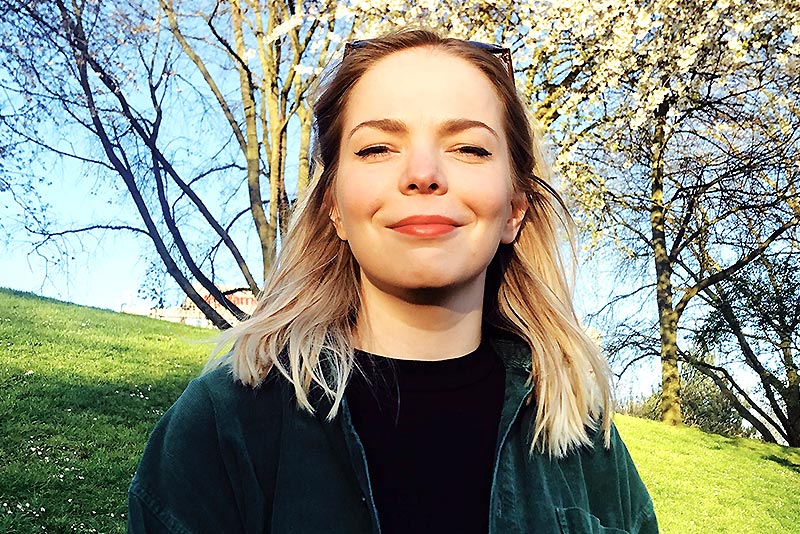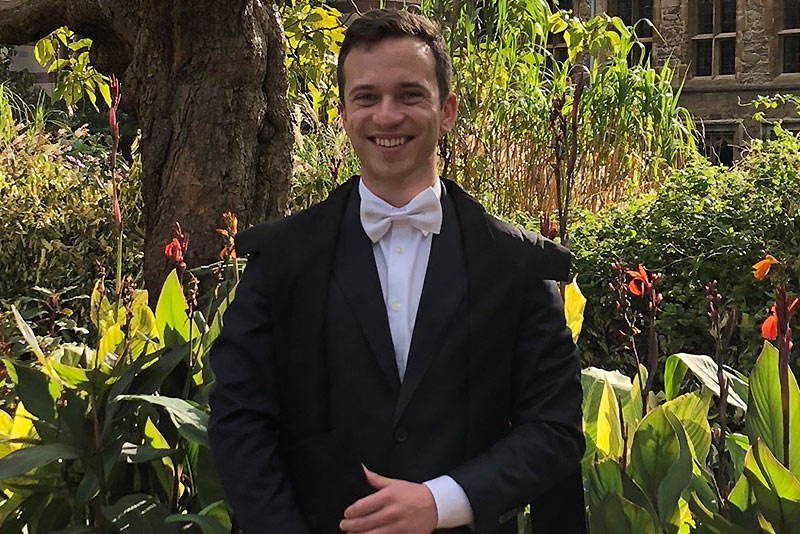A life-changing opportunity for Europe’s brightest graduate students
Established through philanthropy in 2018, the Saven European Scholarship Programme provides generous financial support to master’s and DPhil students from eligible European countries. Triin and Jan, who both belonged to the first cohort of Saven Scholars, explain why this support was so important to them.
‘It was a really good learning process. It made me push myself’
Triin Ojakaar, MSc Psychological Research
By the time she joined Oxford, Triin, who had moved to the UK from Estonia in 2014, was adept at balancing work and study. ‘Coming from the EU it can be quite hard to get funding for your education,’ she explains, ‘so for the whole of my undergraduate degree I worked almost full-time hours in different cafes and bars and so on, as well as for the British Psychological Society. Coming to Oxford was the first time I think in almost ten years that I didn’t have to work alongside my studies.’
Supported by her scholarship, Triin was able to accept the place that she had been offered on the MSc in Psychological Research, which covers theory and methods in core domains of psychology, as well as providing applicants with hands-on research training. She was placed in the Brain and Cognition Lab, working alongside a team exploring how our brains process information and make sense of the world around us. ‘I became a full member of the lab,’ she recalls. ‘I attended weekly meetings where we discussed ongoing projects and I also did my dissertation there.’
 Saven Scholar Triin Ojakaar
Saven Scholar Triin Ojakaar
Initially using virtual reality to study temporal orienting, Triin’s research was momentarily derailed by the COVID-19 lockdown. ‘When the labs closed we realised that I wouldn’t be able to test people in the way I had planned. Everything had to move online. It was the first time we had used these online platforms within the lab – it was a new experience for all of us.’ This turned out, however, to be a blessing in disguise. ‘It was a really good learning process,’ she says. ‘It made me push myself.’
Triin’s revised project focused on temporal cognition – or how people use time to perceive and act. ‘There are certain neurological conditions, like Parkinson’s, where the way you perceive time is changed,’ she explains. ‘To understand why this happens, we first need to understand how time perception changes through normal ageing.’
This approach, which involved asking people to complete multiple tasks online, yielded interesting results from the outset: ‘From quite early on I could see that there were certain people who consistently underestimated certain time intervals, and some people who really overestimated them. People who played lots of computer games, on the other hand, were really good at judging them because it’s something they’ve learnt to do over time.’
‘The scholarship gave me such a great opportunity to really focus on my studies and do a few extra bits on the side as well’
Alongside her studies, Triin also became involved in a student-led project aimed at helping her college, St Edmund’s Hall, to become more sustainable. Working in a small team, she explored what makes people act in more sustainable ways, and how to encourage the student body to become part of sustainable change. ‘The behavioural change literature was quite new to me but the critical aspects that I had learned from my course allowed me to find the best approaches to use,’ she says. ‘It was a lot of fun.’
For Triin, Oxford ‘very quickly became home’, while the sense of community that developed on the course played a key role in helping her to manage her heavy workload. ‘I feel like I learned so much,’ she says. ‘I kind of forgot that I was learning as I went about my work but now, when I stop and look back, I realise how much I grew.’
‘The biggest takeaway for me was the people’
Jan Berge, MSc Economic and Social History
Jan describes coming to Oxford as ‘kind of a dream come true.’ Hailing from Norway, he says it presented a very different proposition to the academic system back at home: ‘I really wanted to come to a place where not only could I have interaction with people studying other subjects, but also to be studying more things myself, not just confined to one subject.’
To ensure that everyone on his course – the MSc in Economic and Social History – started off on an equal footing, each student took the same modules during the first term. After that, however, Jan was able to pursue his own interests. ‘The part of economic history that I really wanted to study the most was financial history,’ he says. ‘I really wanted to know more about how our current financial system has evolved, about how international capital markets have become as intertwined as they are today.’
Jan particularly enjoyed a class he took on the post-war economic order, which led him to examine the bridge between the International Monetary Fund and the Eastern Bloc during the debt crisis of the 1980s. ‘It was really, really interesting,’ he recalls. ‘I really delved into it.’ For his dissertation he decided to focus on the development of capital markets in the Balkans during the early twentieth century.
 Saven Scholar Jan Berge in the grounds of Balliol College. Photo by Andres Herrera Poyatos
Saven Scholar Jan Berge in the grounds of Balliol College. Photo by Andres Herrera Poyatos
For Jan, the time he spent at Oxford was of immense value. ‘It gave me the opportunity to think and become better at structuring my arguments, become more critical and really stretch myself,’ he says. ‘In that sense it was absolutely incredible.’
He puts a lot of this down to the people that he met, both on his course and through his college, Balliol. ‘I was exposed to so many different people that I just wouldn’t ordinarily meet, and that really challenged my thinking,’ he explains. ‘As a human you tend to think in terms of what you’re comfortable with, whereas if you interact with people who think in different ways and who come from different cultures and backgrounds, it just stretches you.’
Had Jan not been awarded a Saven European Scholarship, it’s unlikely that he would have taken up his place at the University. He says: ‘Being an overseas student, my undergraduate days had already cost me enough. The scholarship gave me a lot of breathing room financially.’
Midway through his course, and before the COVID-19 lockdown forced Jan to complete his studies from home, he had the chance to meet Bjorn Saven, the Swedish venture capitalist who funded the scholarship scheme. ‘It was a great to speak with him,’ he says, ‘to have the opportunity to understand his motivation for supporting the programme and to, above all, say thank you.’
SUPPORT STUDENTS AT OXFORD